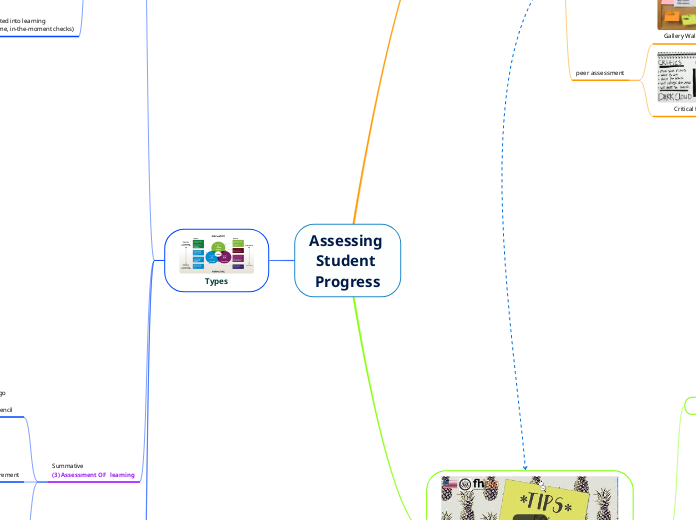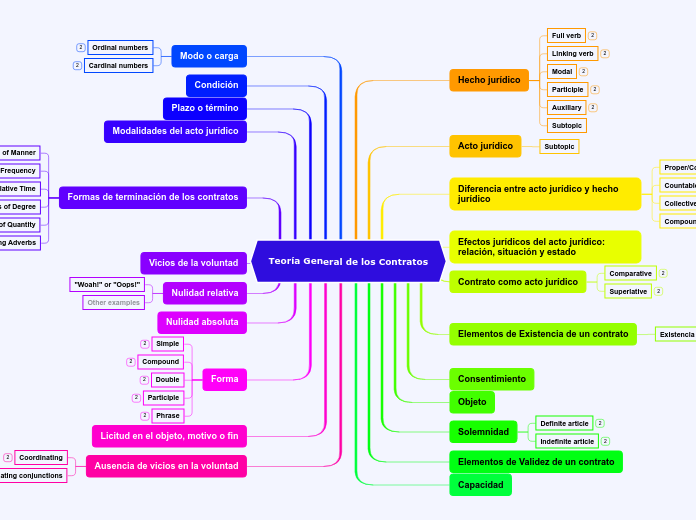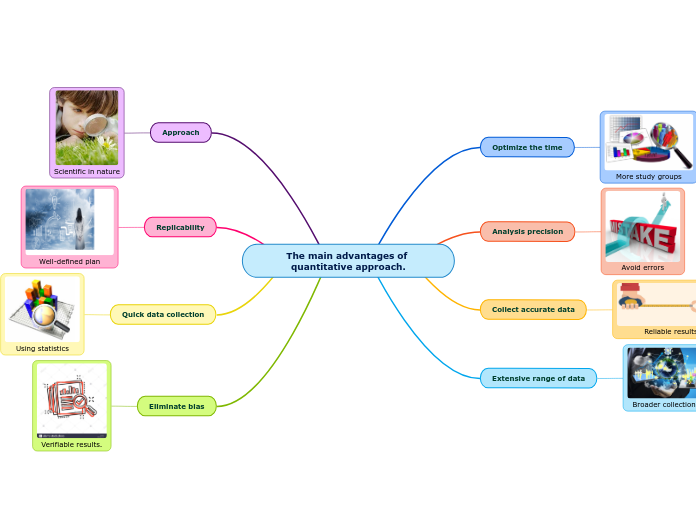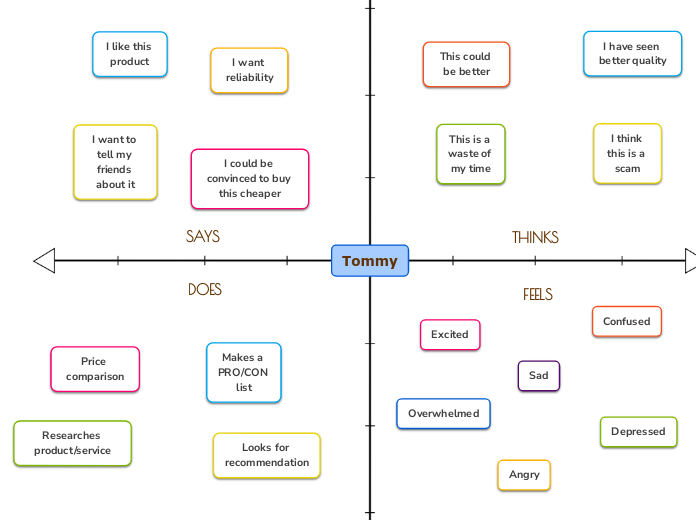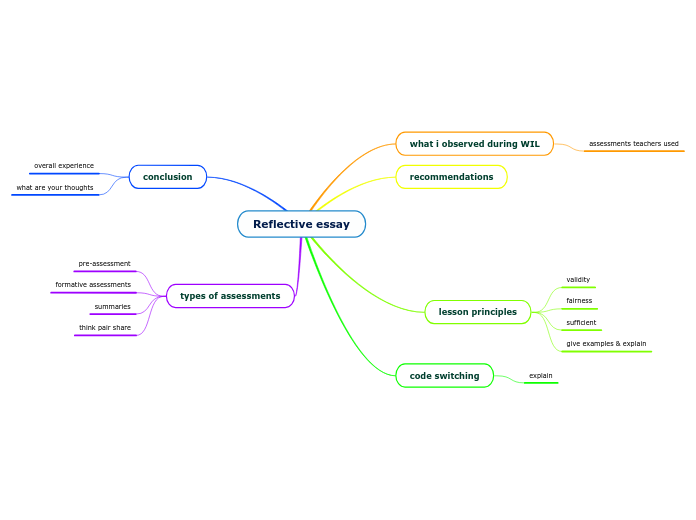Assessing Student Progress
Ipsative
(2-stage)
compare students with themselves
pre-, post-learning
focus on making progress
Competency-based learning
(assessing skills mastery)
Summative
(3) Assessment OF learning
validity
Can a single test assess differentiated classroom/students?
word problems for ELL students
reliability of measurement
Dealing with cheating
affected by rater judgement (i.e. IRR)
fatigue/alertness on test day
measurement error
ways to go beyond paper+pencil
write a play script
record a podcast
Formative
integrated into learning
(real-time, in-the-moment checks)
Examples
Venn Diagram (compare/contrast)
Explain key point
3 Questions
Yes/No Chart (Do/Don't Understand)
Most common misunderstandings
3 Dos and 3 Don'ts
Jigsaw
Carousel Brainstorming
4 Corners
personal whiteboard
Rating 1-10
thumbs up, thumbs down
class discussion
portfolio
journal entry
Lesson reflection
- How engaged were you with this assessment? Why?
- What did you feel most confident about? Why?
- What did you do that led to your success or confidence?
- What was the most difficult part of this assessment? Why?
- What would you do differently next time?
- What was the most confusing? Why?
- What do you know about the topic that the assessment didn’t allow you to show?
entry/exit tickets
3, 2, 1
- 3 things you didn’t know before
- 2 things that surprised you about the topic
- 1 thing you want to start doing with what you’ve learned
1-minute papers
- Most important learning from the day and why
- Most surprising concept and why
- Most confusing topic and why
- Something I think might appear on a test or quiz and why
visual what they learned
class polls/anonymous voting
impromptu quizzes
purpose
(2) Assessment AS learning
(students as own assessors)
Language:
- Instead of "This counts towards your grade."
- Try "You're doing great with X but could use more practice with Y."
Delay on grades
- Hold off on giving grades
- Give comments without points deduction. Ask for reflections and corrections.
Lower the stakes:
- Design low stakes assignments focused on concept.
- Not worried about losing points.
Provide retakes:
- For the sake of learning, not raising grades.
require students ask Qs about own learning
Thinking strategy:
Think, Puzzle, Explore: What Qs do you have about this topic?
Connect, Extend, Question: Wha new Qs have emerged?
corrective feedback for
student's confirmation bias
self-assessment
Exam Wrapper
Post-exam meta-cognitive assessments
(1) Assessment FOR learning
(informs planning of future learning for T and S)
ongoing/actionable feedback as a routine
for students (self-/peer) to recognize what they don't know
for teachers to plan lessons,
group students,
differentiate
student diagnostic
(pre-assessment)
start of class/unit surveys
gaps in prerequisite learning
what students already know
Backward design
(know the learning outcome)
3. Content: What materials will they need?
2. Assessment: How will students prove they know? Product to produce?
1. Objective: Desired outcome, what students should know, be able to do?
Rubrics
- Use simple language that can be understood
- Use pictures/symbols 😀🤨😕
- Use "I" language and "can do" statements ("I can write a short simple postcard")
- Description as observable behaviour (not "understand why..." Rather "I can explain why...")
- Avoid adjectives like "good" and "excellent"
- Make levels clear
- Use parallel language.
- Teach the rubric.
Content
Teach the rubric
Description must be observable
Not "understand why..."
Instead "I can explain why..."
Parallel language
"I" language
"Can do" statement
Simple, Age-appropriate
Below Standard/At Standard
Unsatisfactory/Competent
Still Learning/Sometimes/Almost always
😕🙂😁
⭐️/⭐️⭐️/⭐️⭐️⭐️
Types
Checklist
Single-Point
not easily quantified
(avoids peer comparison)
no boundaries on student performance
student freedom
space to write strengths & weaknesses
Analytic
Developmental
Holistic
less/no actionable feedback
Quick to grade
Fixes for grading
peer assessment
Critical friends
Benefit:
- Change our lens towards critique.
- Become open-minded to feedback
- Willing to give support.
"When groups are able to successfully critique, they become learning organization."
Gallery Walks protocol
Peer-Feedback sentence stems
Assign students role to focus feedback on:
- Significant content
- Driving question
- In-Depth inquiry
- Public audience
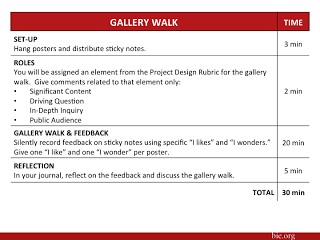
Medium:
- In person
- or in online forum
Principles (Ron Berger):
- Be kind
- Be specific
- Be helpful
clear rubrics = set expectations/self-track progress
have students practice using rubric on example work
Grading for Growth
Going gradeless
Student self-assessment/awareness drives effort to learn
allow students to make go back, correct/resubmit
motivate avoidant-oriented and
success-oriented students
from "what's my grade?"
to "What can I do better?"
through effort, earn higher scores
decided at end-of-year 1:1 conference
assessments are submitted in parent portal but directly used for grading
SE2R Narrative Feedback Model
(Summarize, Explain, Redirect and request resubmission)
Summarize:
"You wrote a brief reflection on The Hunger Games, in which you mix plot details and your own personal connection."
Explain:
"The summary information demonstrates comprehension of plot elements including characterization and conflict -- elements of fiction we recently learned. I think, however, that you misidentify the rising action. I like how you show empathy for Katniss and her plight, as she faces the prospect of killing Peeta (hint: what story element is this?). Elaborating on this part would help."
Redirect and request resubmission:
"Please review the presentation on rising action on our classroom web site. Then, revise your reflection, reworking the part on rising action, in order to demonstrate understanding of the concept. Then, elaborate on your feelings about Katniss's tough decision near the end of the story. When you have finished, e-mail me or send me a message on our private message board, telling me that you've done so."
